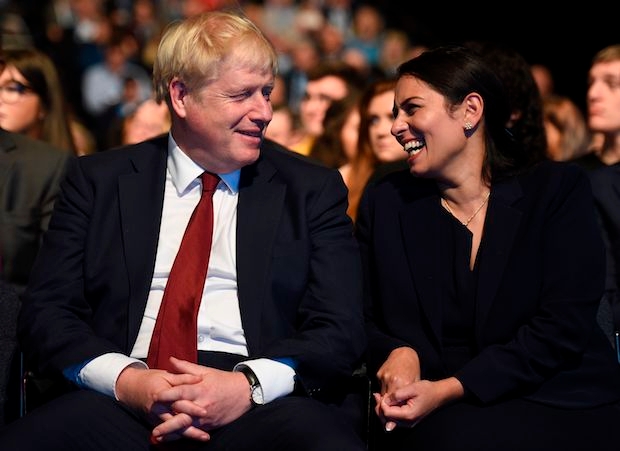Although Brexit remains the top of the news agenda, the Conservatives believe they will need to talk about more than just leaving the EU if they are to triumph in an early election. Boris Johnson used his conference speech to push a domestic agenda beyond Brexit. The areas he focussed on were the same ones that Downing Street has repeatedly pushed since the summer: the NHS, law and order, education and investment in the north.
Johnson singled out tackling crime as a priority:
‘The first thing we must do in spreading opportunity is to insist on the equal safety of the public wherever you live to make your streets safer and that is why we are recruiting 20,000 new police officers and that is why we are committing now to rolling up the evil county lines drugs gangs that predate on young kids and send them to die in the streets to feed the cocaine habits of the bourgeoisie.’
The comments chime with Priti Patel’s speech on Tuesday. The Home Secretary used the set piece event to declare that the Conservative Party was taking its “rightful place as the party of law and order once again” and send a message to criminals: “We are coming after you.” The tough rhetoric (and plan to give more police officers tasers) has also come under criticism in some quarters.
While Johnson is keen to pitch himself as a liberal Conservative but there is one area in which those around him concede there has been a move to the right – and that’s on crime. The view in Downing Street is that in an election it’s hard to be too tough on crime. As I write in the i paper, there’s a sense that Westminster is out of touch with the public mood on tackling law and order. Patel suffers no such issue as liberal groupthink and therefore is viewed as Johnson’s ideal home secretary.
Near the end of Theresa May’s premiership, there was a concern that the Tories were losing their standing as the party of law and order. In the 2017 snap election, aides had been left blindsided when Labour successfully managed to turn the issue of terror attacks in the UK into one that hurt the Tories – the number of bobbies on the beat. As a former home secretary, May was reluctant to pour funds into more police officers, seemingly over concerns it would undermine her legacy in the department.
It follows that as Home Secretary, Patel and the government sense there is some catching up to do. It’s particularly important as the seats the Tories need to win in an election to have a majority are areas that voted heavily to Leave but in many cases have never turned blue. The Tories need a popular domestic agenda to accompany their Brexit message in order to get some tribal voters over the line.
Key target areas are in the Midlands, the North and Wales. There’s a sense in government that with violent crime on the rise, the issue has become pivotal to many voters. County lines drug problems mean that crime is no longer viewed as mainly confined to big cities. In sleepy English towns more and more residents are aware of a drug-related death. The view in government is that people with personal experience of crime have an appetite for a tough stance – rather than one favoured by liberals who push for rehabilitation over punishment.
Polling suggests that the tougher approach wins. As one Tory insider puts it: “If you did a poll on crime, Priti would be more in step with the country than any other MP.” Others in Government point to when Patel said she wanted criminals to feel terror. Opposition parties were aghast but polling was positive – 72 per cent of British adults surveyed agreed with her statement.







Comments